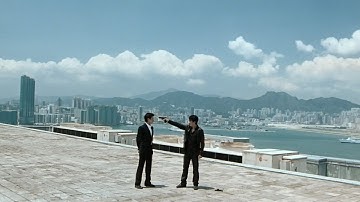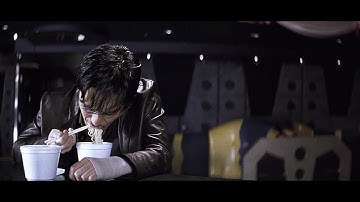Infernal Affairs
IMDB
8
DOUBAN
9.3
Latest Questions for Infernal Affairs (20)
The impact of sequels to the Infernal Affairs trilogy on the masterful ambiguity, mystery, and world-building of the first film is a complex and debated issue.
Martin Scorsese's The Departed, as a remake of the Hong Kong film Infernal Affairs, remains faithful to the spirit of the original while undergoing significant "localization" adaptations.
Why "Infernal Affairs" is Hailed as the "Savior of Hong Kong Cinema" and How It Broke the Mold of Traditional Crime Thrillers to Set a New Benchmark
I.
One of the most captivating narrative features of Infernal Affairs is its masterful use of information asymmetry. This is not only the core driving force behind the story's tragedy but also the key te...
The reason why the line "three years after three years" became iconic extends far beyond merely expressing the passage of time. It profoundly encapsulates the identity loss, shattered hope, and endles...
The death of Chan Wing Yan in Infernal Affairs is the "stroke of genius" that elevates the film to classic status. It perfectly embodies the movie's core themes and delivers immense artistic impact.
As a classic of Hong Kong cinema, Infernal Affairs excels in its masterful narrative pacing, characterized by a swift, concise, and high-density style that successfully establishes complex character r...
As a classic Hong Kong crime thriller, the use of color in Infernal Affairs is a key element in creating the film's atmosphere and hinting at the characters' psychological states.
The elevator scene at the end of Infernal Affairs serves as a visual metaphor for Lau Kin Ming's fate. Its enclosed nature and erratic ascent and descent profoundly symbolize his tragic destiny—trappe...
In the film Infernal Affairs, the audio shop and the song "The Forgotten Times" carry profound symbolic meanings. They serve not only as a brief sanctuary for the two protagonists but also foreshadow ...
Videos for Infernal Affairs
![Infernal Affairs (2002) ORIGINAL TRAILER [HD 1080p]](https://i.ytimg.com/vi/GNCv6zj8tIg/hq720.jpg?sqp=-oaymwEjCOgCEMoBSFryq4qpAxUIARUAAAAAGAElAADIQj0AgKJDeAE=&rs=AOn4CLAr12twOvzujRk0ymfQAXCVrcRlPA)
Infernal Affairs (2002) ORIGINAL TRAILER [HD 1080p]
HD Retro Trailers

Infernal Affairs 2002 (Audiophile Scene)
Archimago X

INFERNAL AFFAIRS
澤野弘之 / SawanoHiroyuki[nZk]

無間道1-3 悲傷配樂 Infernal Affairs 1-3 sad soundtracks
chan anthony

無間道 Infernal Affairs 黃Sir出事了
Benson

Infernal Affairs III Theme Song
kyo175

Infernal Affairs Trilogy | 4K Restoration Trailer | Opens September 16
Film at Lincoln Center

Infernal Affairs Theme Song
kyo175

Infernal Affairs (2002) - Eating Take Out Noodles With Chopsticks scene
Food For Watch

Japan Tour - Infernal Affairs (2002)
FilmArchive

The Departed vs. Infernal Affairs: Which Does It Better? 🎬
The BM Show

Infernal Affairs & Departed & Double Face Comparison
Neos21
![Infernal Affairs II Theme "1991 - Hungarian Choir" [無間道]](https://i.ytimg.com/vi/f-kj4WxKsvo/hqdefault.jpg?sqp=-oaymwE9COADEI4CSFryq4qpAy8IARUAAAAAGAElAADIQj0AgKJDeAHwAQH4Af4EgALgA4oCDAgAEAEYZSBXKFUwDw==&rs=AOn4CLBfv0IrkxfcesisK4wS6xc248Ldsg)
Infernal Affairs II Theme "1991 - Hungarian Choir" [無間道]
EdD1EgJiNaJ

無間道 (粵)-劉德華 / 梁朝偉
Miss

Andy Lau & Tony Leung: Infernal Affairs OST (粵)【English/Romanization】
lookatthesigns

Infernal Affairs - Mole
Glenn J

Infernal Affairs: Essence(SP Wong Was Dead)
mv8245yhk

The Departed & Infernal Affairs - One Scene, Two Movies
Kristof Boghe
![Infernal Affairs (2002) Original Trailer [4K]](https://i.ytimg.com/vi/GqdXakBnmsE/hq720.jpg?sqp=-oaymwEjCOgCEMoBSFryq4qpAxUIARUAAAAAGAElAADIQj0AgKJDeAE=&rs=AOn4CLBlkHbWoZNQh7vu6y5AePc6EPNe6Q)
Infernal Affairs (2002) Original Trailer [4K]
HD Retro Trailers
How to Get $FAQ Rewards
We are seeking contributions from many people to reach 100 million questions. We will provide $FAQ token rewards to all contributors
There are 3 ways to earn $FAQ rewards
- 1. Ask questions to earn $FAQ rewards
- 2. Provide API_KEY to earn $FAQ rewards
- 3. Random drops of $FAQ rewards when browsing questions
 The 'Infernal Affairs' Sequels: A successful expansion of the world-building, or did they weaken the original's perfect ambiguity and mystique?
The 'Infernal Affairs' Sequels: A successful expansion of the world-building, or did they weaken the original's perfect ambiguity and mystique?